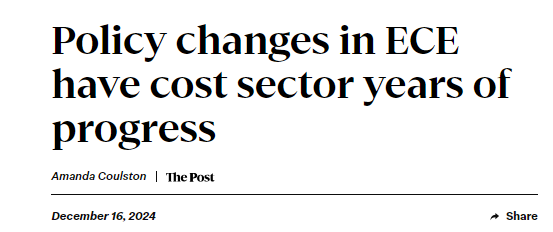Government Changes Harm Early Childhood Education
Published on Dec 16

Whānau Manaaki CEO Amanda Coulston has written the opinion piece below. This article was published in The Post on 01 December, 2024.
You can read the original article here.
Early childhood education takes place at the most important period in a child’s life, when the most learning occurs and when the foundation for all future learning is set.
It’s therefore hugely disappointing that the government has turned the clock back on a number of changes that had taken years of advocacy to achieve.
The rhetoric that regulation is holding us back does not stand up to scrutiny, no matter how often the government repeats this. Strong regulations protect babies and young children who often spend many of their waking hours in education and care services.
What has the government done?
· The government abolished network management – which addressed the oversupply of services in some areas and undersupply in others. Now, anyone can set up a center and be guaranteed public funding even if it is not needed. This is a waste of taxpayers’ money and simply irresponsible.
· The government abolished pay parity for relieving and fixed term qualified early childhood teachers – with no mechanism to ensure that services don’t simply replace permanent staff with fixed term teachers on the minimum wage. This reverses years of work to improve early childhood teacher pay.
· The government changed the “person responsible’ requirements – so a fully registered teacher does not need to be in charge of a service –new graduates and beginning teachers can be the ‘person responsible’.
· After years of lobbying to improve standards for homebased educators, ensuring they understand child development, the government has now said that services can be set up with no educators having any qualification.
These four reversals undermine years of consultation on what would improve childhood education for children. Because they are quite complex and don’t affect every service immediately, and because many services are worried about the government’s agenda and want to follow a policy of appeasement, there has been muted criticism from the sector.
What is the government doing?
We know the government supports the business of early childhood education, which is about making profits from taxpayer funding. The move against regulation is spearheaded by a part of the sector dominated by private business interests. All of the changes announced have been about keeping costs down and improving profitability, not about improving standards and quality experiences for children.
What’s important in early childhood services?
High quality early childhood education is characterised by warm, responsive, knowledgeable skilled and caring qualified teachers. It requires ratios of teachers-to-children that enable relationships to flourish, and teachers who value and respond to children’s language, culture and identity. High quality early childhood education requires environments that provide for calm spacious spaces where children can play and learn free from stress, noise and overcrowding. Qualified teachers, goods ratios, and quality environments cost money, and a government that values business interests may do so at the expense of children.
Our kindergarten associations have been asking our parents what they value about kindergarten. Here’s what they say:
“Invest in our teachers! They have the biggest responsibility of any teachers in our country.”
“Deepest gratitude for the incredible dedication love and patience you show every day”
“The care and encouragement you give makes such a positive impact, helping each child feel valued, confident and excited to learn.”
“Patient, kind teachers willing to take time to know and understand our tamariki and their individual needs – physical, physical, mental, emotional and behavioral.”
High quality early childhood education costs money – but it does give a return on investment that is up to $16 for every dollar spent, according to Nobel prize winning economist James Heckman. We believe the Government should ensure that every young child has access to high quality early childhood education, and to do that, they need to increase spending and ensure it goes towards supporting children and whānau – something that David Seymour himself has said publicly. It should not go into the back pockets of business owners.
The benefits of ECE are not only reasonable, affordable, and proportionate to the costs - they far exceed them. If the outcome of future government policy retains children at the centre of regulation and improves ECE in Aotearoa, our investment will be realised – lets hope the government realises this too.

